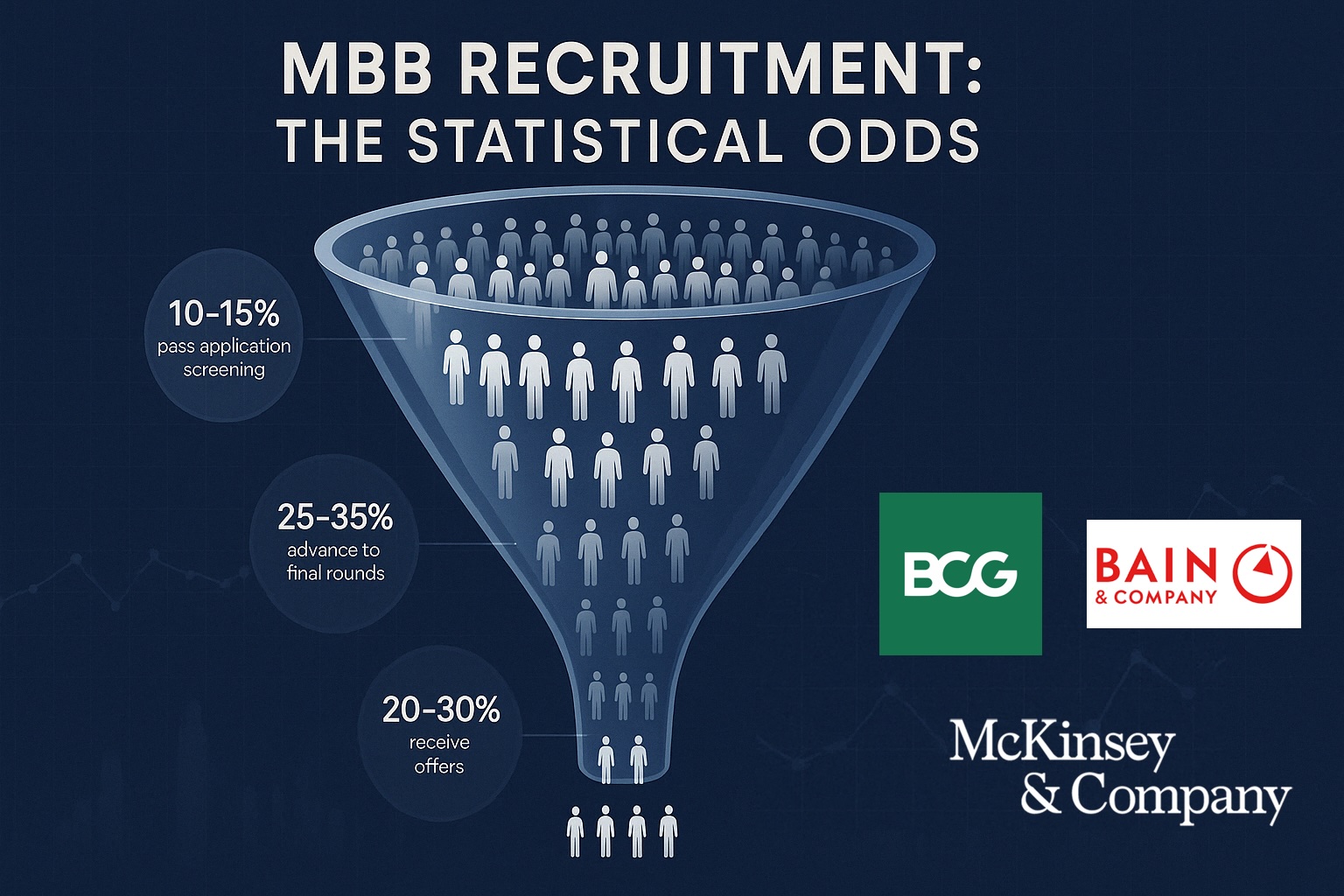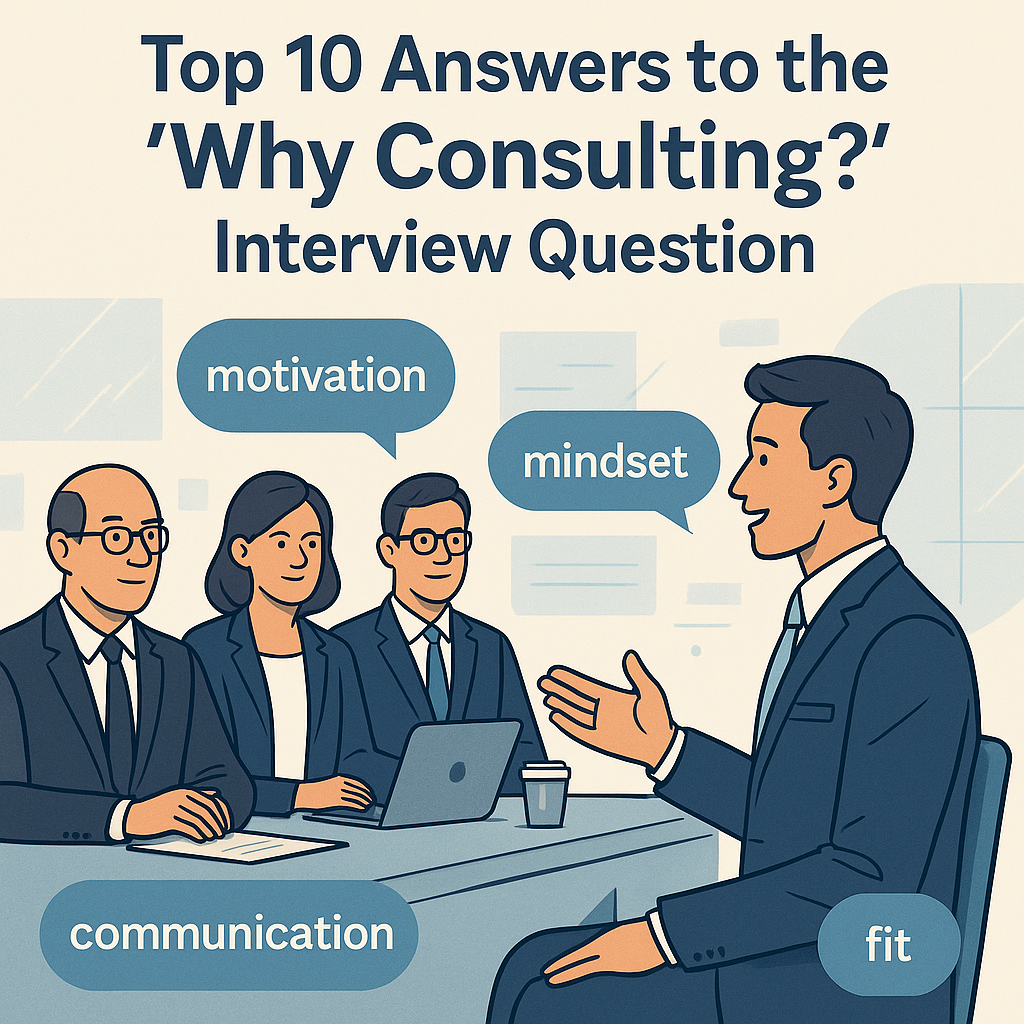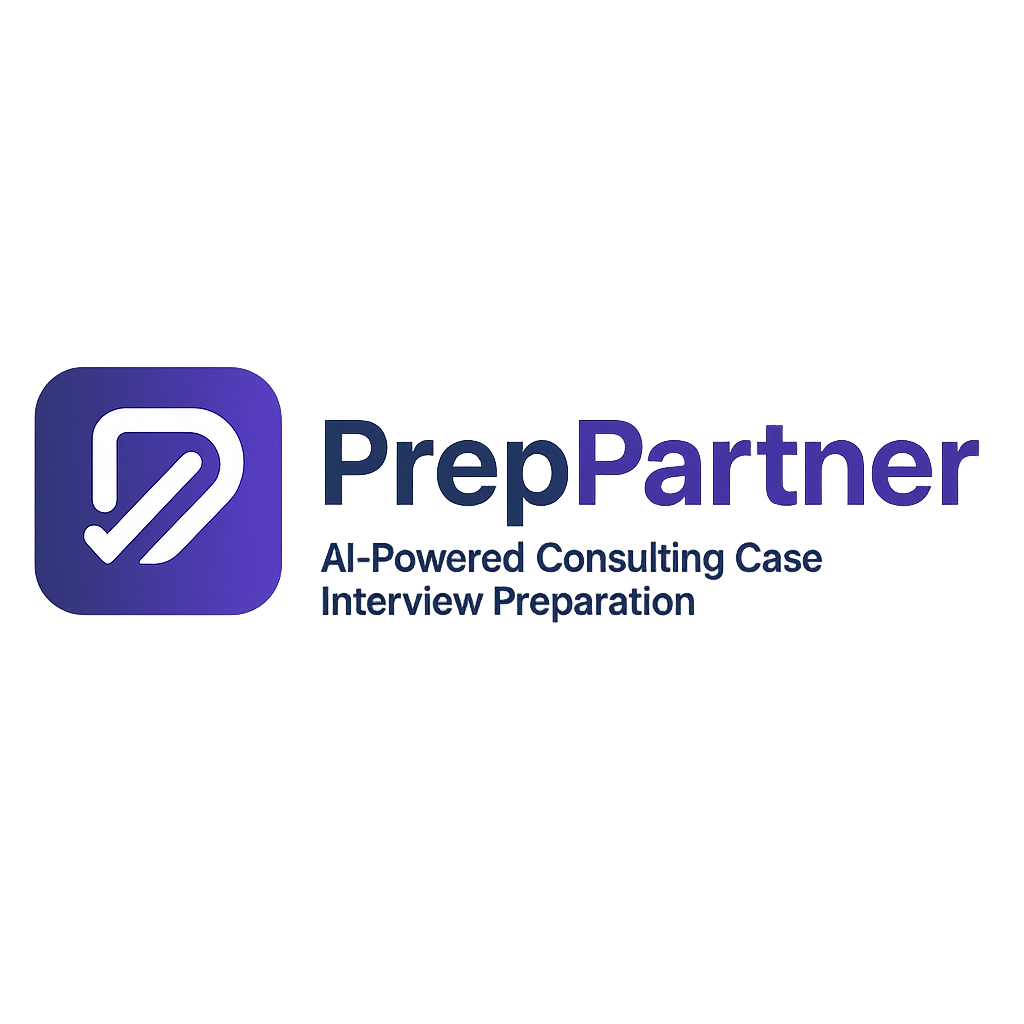
What Are Your Chances of Getting a Job at MBB? Breaking Down the Recruitment Odds
The journey to landing a job at McKinsey, BCG, or Bain (collectively known as MBB) is notoriously difficult. But just how difficult is it? This article breaks down the statistical odds at each stage of the recruitment process, offering clear insights into what you're up against and how different factors affect your chances.
The Bottom Line: Overall Acceptance Rates
Let's start with the stark reality:
- Overall acceptance rate: Between 0.5% and 1.5% of all applicants receive offers
- McKinsey: Receives approximately 200,000 applications annually for roughly 2,000 positions (1% success rate)
- BCG and Bain: Maintain similarly selective recruitment standards
For perspective, these odds make MBB firms more selective than many elite universities like Harvard, which has approximately a 3-4% acceptance rate.
The MBB Recruitment Funnel: Success Rates By Stage
The recruitment process typically involves multiple stages, each with its own success rate:
Stage 1: Application Screening (Resume Review)
- Pass rate: 10-15% of applicants receive first-round interview invitations
- Screening focus: Academic excellence, leadership experience, relevant internships, and quantitative skills
- Key insight: This is the stage with the highest elimination rate (85-90% of candidates are filtered out)
Stage 2: Online Assessments
- Many firms now include tests like McKinsey Solve, BCG's assessment, or Bain's SOVA test
- These evaluate cognitive abilities, problem-solving approaches, and sometimes behavioral traits
- Success rates are incorporated into the overall application screening figures
Stage 3: First-Round Interviews
- Pass rate: 25-35% of first-round interviewees advance to final rounds
- Format: Typically includes both case interviews and fit/behavioral questions
- Evaluation: Problem-solving abilities, structured thinking, quantitative skills, communication, and cultural fit
Stage 4: Final-Round Interviews
- Pass rate: 20-30% of final-round candidates receive offers
- Format: Similar to first rounds but with more senior interviewers (Partners/Principals)
- Focus: Comprehensive evaluation of skills with increased emphasis on strategic thinking and leadership potential
The Funnel Visualization: From 1,000 Applicants
To put these numbers in perspective, here's what happens to a typical batch of 1,000 MBB applicants:
- Initial applications: 1,000 candidates
- First-round invites: 100-150 candidates (10-15%)
- Final-round invites: 25-50 candidates (25-35% of first-round interviewees)
- Offers extended: 5-15 candidates (20-30% of final-round interviewees)
This results in the overall 0.5-1.5% success rate (5-15 offers from 1,000 applications).
How Recruitment Channel Affects Your Odds
Your chances vary significantly depending on how you apply:
Undergraduate Recruitment
- Target school first-round interview rate: 10-15%
- Non-target school first-round interview rate: Typically below 5%
- Overall offer rate for undergraduates: Often below 1%
- Key insight: School prestige significantly impacts screening success
MBA Recruitment
- Target MBA program first-round interview rate: 70-80% (dramatically higher than other channels)
- Overall offer rate at top MBA programs: ~10-15% of all applicants
- Success rate for serious MBA recruiters: Approximately 30-35% of those fully committed to the MBB recruiting process
- Key insight: For MBA candidates from elite programs, the challenge shifts from getting an interview to performing well in it
Experienced Hire Recruitment
- Success rates: Highly variable based on specific expertise, timing, and firm needs
- Process: Less standardized, often requiring effective networking
- Key insight: Success depends heavily on matching your specific skills to the firm's current needs
Geographical Variations
Office location significantly impacts competitiveness:
- Most competitive: Major offices in English-speaking locations (New York, London, San Francisco, Boston)
- Potentially less competitive: Offices requiring proficiency in less common languages
- Regional differences: Hiring volumes and growth rates vary across regions (US, Europe, Asia)
Factors That Impact Your Odds Beyond The Numbers
While the statistics paint a challenging picture, several factors can positively influence your chances:
1. Profile Strength
- Academic excellence: Strong GPA from a prestigious institution
- Relevant experience: Internships or roles demonstrating applicable skills
- Leadership achievements: Evidence of initiative and impact
- Quantitative aptitude: Demonstrated analytical abilities
2. Application Quality
- Resume optimization: Clear, quantified achievements and tailored content
- Networking effectiveness: Connections that help your application stand out
- Referrals: Internal advocates can significantly boost your chances
3. Interview Preparation
- Case interview mastery: Structured problem-solving approach
- Communication skills: Clear, concise, and confident articulation
- Fit preparation: Compelling personal narrative aligned with the firm
Practical Strategies to Improve Your Odds
Given these challenging statistics, how can you maximize your chances?
For Undergraduates:
- Target internship opportunities that build relevant skills
- Invest heavily in case interview preparation (25-40 practice cases)
- Consider graduate education at a target school if initial recruitment is unsuccessful
For MBA Candidates:
- Choose a target MBA program if consulting is your primary goal
- Participate in pre-MBA programs offered by consulting firms
- Network extensively with firm representatives
- Master case interviews through rigorous practice
For Experienced Hires:
- Develop and highlight specialized expertise
- Leverage networking to identify specific needs within target firms
- Craft a compelling narrative connecting your experience to consulting
Conclusion: Navigating the Gauntlet
The journey to MBB is statistically one of the most challenging professional recruitment processes in the world. With overall acceptance rates hovering around 1%, preparation must be strategic and thorough.
While the odds are daunting, they're not insurmountable for candidates who:
- Understand the specific hurdles at each stage
- Strategically position themselves through the right academic and career choices
- Prepare extensively for interviews
- Develop a compelling personal narrative
Remember that the statistics represent averages across diverse applicant pools. Your individual odds are influenced by your specific background, preparation, and performance. Focus on maximizing the factors within your control, and approach each stage with clarity about what firms are seeking.
Taking Your Preparation to the Next Level
One of the challenges of consulting recruitment is getting enough high-quality practice. This is where tools like PrepPartner.ai can help transform your preparation:
- On-demand practice: Access realistic case interviews whenever convenient
- Natural voice interaction: Practice speaking through cases as you would in real interviews
- Personalized feedback: Receive objective analysis of your performance
- Consistent practice: Maintain momentum regardless of partner availability
Whichever path you choose, remember that success in MBB recruitment isn't just about beating the odds—it's about demonstrating the exceptional problem-solving, analytical, and communication skills that make you a valuable consultant.
 PrepPartner TeamPrepPartnerThe Guide to Case Interview Prep: Strategies for Success in 2025Everything you need to know about case interviews in 2025—from structure and strategy to frameworks, quant skills, and new AI-powered prep tools.Read More
PrepPartner TeamPrepPartnerThe Guide to Case Interview Prep: Strategies for Success in 2025Everything you need to know about case interviews in 2025—from structure and strategy to frameworks, quant skills, and new AI-powered prep tools.Read More PrepPartner TeamPrepPartnerTop 10 Answers to the 'Why Consulting?' Interview QuestionThe 'Why Consulting?' question is a make-or-break moment in your consulting interview. We share 10 strong example answers that show genuine motivation, personal fit, and an understanding of what consulting really is.Read More
PrepPartner TeamPrepPartnerTop 10 Answers to the 'Why Consulting?' Interview QuestionThe 'Why Consulting?' question is a make-or-break moment in your consulting interview. We share 10 strong example answers that show genuine motivation, personal fit, and an understanding of what consulting really is.Read More PrepPartner TeamPrepPartnerWelcome to Our BlogAn introduction to our blog and what you can expect to find here.Read More
PrepPartner TeamPrepPartnerWelcome to Our BlogAn introduction to our blog and what you can expect to find here.Read More